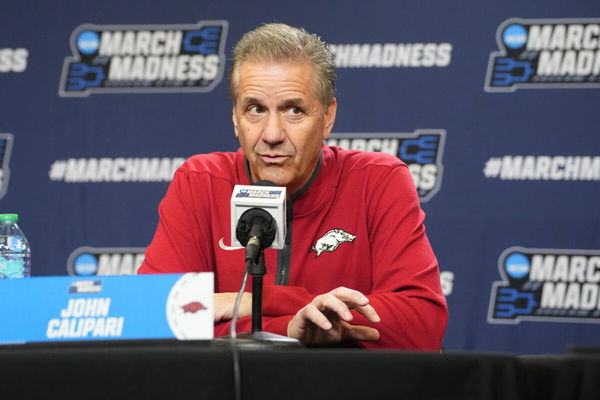
via Imago
NCAA, College League, USA Basketball: NCAA Tournament First Round Practice Mar 19, 2025 Providence, RI, USA Arkansas Razorbacks head coach John Calipari answers question during the First Round Practice Session press conference, PK, Pressekonferenz at Amica Mutual Pavilion. Providence Amica Mutual Pavilion RI USA, EDITORIAL USE ONLY PUBLICATIONxINxGERxSUIxAUTxONLY Copyright: xGregoryxFisherx 20250319_jla_fb5_201

via Imago
NCAA, College League, USA Basketball: NCAA Tournament First Round Practice Mar 19, 2025 Providence, RI, USA Arkansas Razorbacks head coach John Calipari answers question during the First Round Practice Session press conference, PK, Pressekonferenz at Amica Mutual Pavilion. Providence Amica Mutual Pavilion RI USA, EDITORIAL USE ONLY PUBLICATIONxINxGERxSUIxAUTxONLY Copyright: xGregoryxFisherx 20250319_jla_fb5_201
The atmosphere crackled with energy, every seat filled, every voice hanging on the edge of history. John Calipari vs. Rick Pitino—two coaching titans with unfinished business, colliding on college basketball’s grandest stage. “He’s on chapter two of his new book, and we’re on chapter one,” Calipari said before the matchup via ESPN. “It’s both of us writing another story and being able to come back here.” For Arkansas, this wasn’t just a game—it was a chance to rewrite their season, to defy expectations, to silence the skeptics. And as the final buzzer sounded, the Razorbacks weren’t just turning the page. They were authoring a masterpiece.
The matchup against Rick Pitino wasn’t just another game—it was a chapter in a decades-long saga. Calipari and Pitino, both Italian-American coaching icons, have clashed in March Madness before. Pitino’s Kentucky teams beat Calipari’s UMass squads in the 1992 Sweet 16 and 1996 Final Four, while Calipari’s Kentucky toppled Pitino’s Louisville in the 2012 Final Four and 2014 Sweet 16 en route to deep tournament runs.
This time, in Providence—a city tied to both men’s early successes—Calipari’s 75-66 victory marked his third NCAA tournament win over Pitino, flipping the script on a rivalry that once favored the elder statesman.
ADVERTISEMENT
Article continues below this ad
Arkansas wasn’t supposed to be here. A rocky SEC season, an 8-10 conference record, and a missed shot at the tournament title had them barely clinging to hope. Meanwhile, St. John’s steamrolled through the Big East, securing a No. 2 seed with eyes set on a deep run. But when the final buzzer sounded, it was Calipari’s Razorbacks celebrating a stunning 75-66 upset—punching their ticket to the Sweet 16 and sending a shell-shocked St. John’s squad packing.
And in the aftermath, national reporter Seth Davis reflected on the moment with a sense of regret. “Such a Coach Cal thing to do, Loose games you’re supposed to win and win games you’re supposed to lose,” Davis admitted in his recent appearance on the Rich Eisen show. “And that’s if you do it as he has. Look, I took plenty of shots at him this season. I thought he got an unfair rap at Kentucky.”
Calipari had spent years as a lightning rod for criticism. Even as the wins piled up and NBA draft picks rolled in, the doubters never let up. To some, he was more showman than strategist, more brand-builder than banner-raiser. When Arkansas’ social media pushed its tournament case on March 16, Seth Davis called it a desperate ploy. But on this night, there was no debate—Calipari’s impact wasn’t just about perception. It was about results. “He didn’t get fired at Kentucky. He could still be there,” Davis admitted. “But he had the foresight and the humility to say, ‘You know what, I need to change now.’ He obviously wasn’t going to go just anywhere.”And now, under the bright lights of March Madness, it was clear—Calipari had made the right move.
His ability to keep his team together, to inspire belief even in the most trying moments, was now paying off in Arkansas. “They wouldn’t have made this turnaround if he really, truly did make it all about him,” Davis continued. “He’s an easy target, a piñata. We all take our shots at him. But inside that locker room, you have to keep the belief of your players, and they won’t give you that belief if they think you want to make it all about you. So I give him enormous credit for holding that program and that locker room together.”
It wasn’t just a symbolic win.
What’s your perspective on:
Is Calipari's success with Arkansas a sign that Kentucky underestimated his coaching genius?
Have an interesting take?
Calipari’s redemption: How leaving Kentucky made him more dangerous
It was a reminder of what made Calipari an institution at Kentucky for 15 years. The same system that turned Kentucky into an NBA pipeline was now reviving Arkansas. The Wildcats’ best commits, like Karter Knox and Boogie Fland, were now his Razorbacks, blending with Arkansas’ existing talent to form a team capable of beating anyone.
ADVERTISEMENT
Article continues below this ad

via Imago
NCAA, College League, USA Basketball: Arkansas at Kentucky Feb 1, 2025 Lexington, Kentucky, USA Arkansas Razorbacks forward Karter Knox 11 shoots the ball during the first half against the Kentucky Wildcats at Rupp Arena at Central Bank Center. Lexington Rupp Arena at Central Bank Center Kentucky USA, EDITORIAL USE ONLY PUBLICATIONxINxGERxSUIxAUTxONLY Copyright: xJordanxPratherx 20250201_tbs_li0_319
The transition, though painful for many in Lexington, was undeniable in its effectiveness. Even Calipari’s return to Rupp on 2nd February, when he was 1-6 in the SEC also was not quiet. The boos, the resentment, and the history made sure of that. But in the end, the scoreboard 89-79 spoke the loudest.
And for those who had once dismissed him, there was a growing realization that perhaps they had underestimated the man who had once been the face of Kentucky basketball. “I looked up a couple times,” Calipari admitted postgame, “and I thought we were losing. Because I kept looking at Kentucky instead of Arkansas.”
ADVERTISEMENT
Article continues below this ad
The irony was impossible to ignore. In leaving Kentucky, Calipari had found a way to win again. And in watching him do so, some who once doubted him were now forced to reconsider. The critics had taken their shots. But Calipari, as always, had the last word.
ADVERTISEMENT
ADVERTISEMENT
ADVERTISEMENT
ADVERTISEMENT


Is Calipari's success with Arkansas a sign that Kentucky underestimated his coaching genius?